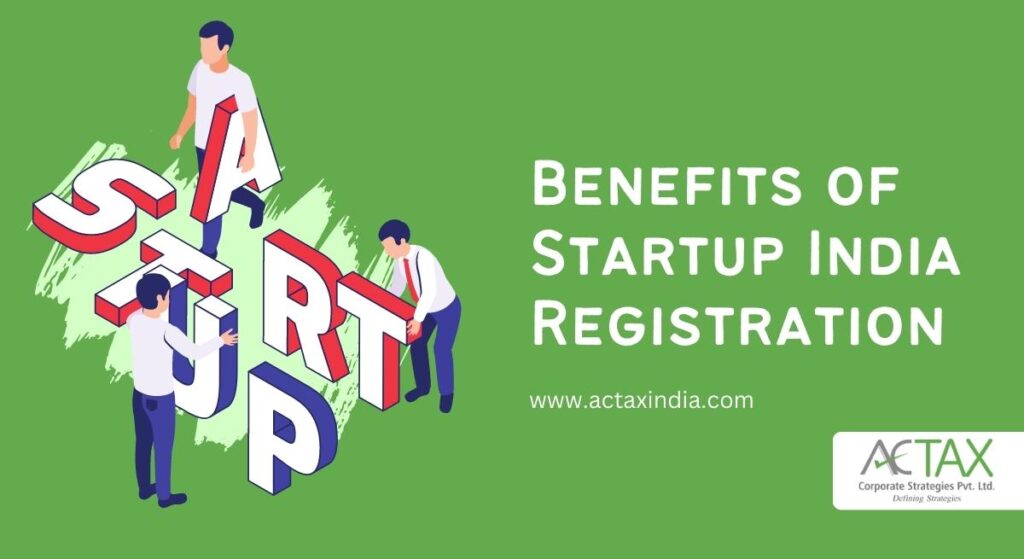Table of Contents
Startup Registration in India - Eligibility, Scheme, Process & Benefits!
What is Startup?
A startup is a company that’s in the initial stages of business or in the first stages of operations. Founded by one or more entrepreneurs with a goal to develop a product or service which they believe is in demand. Normally founders finance their startups, funding sources include family, friends, crowdfunding, and loans. Founders even try to attract outside investment. Generally, startups start with high costs and limited revenue, focusing on innovation and opportunities to learn.
Eligibility Criteria for a Company to be called ‘A Start-Up’
Business should be registered under MCA as one of the below-provided Business structures.
- Private Limited Company
- Limited Liability Partnership (LLP)
- Registered Partnership (under Indian Partnership Act, 1932)
- A company is considered a startup only if the total turnover in the previous financial year doesn’t exceed Rs 100 crores.
- The maximum period for tax exemption for a startup is ten years. A company that is registered for more than ten years is not eligible as a startup for claiming tax exemptions.
- A startup should be built from scratch on an innovative idea. A business that is created from restructuring or from an existing company is not considered a startup.
- A startup should be based on innovation and problem-solving so that it can fulfill the needs of the product or service in the market. Due to its scalability, it should be able to create jobs.
Start-Up India Scheme

The Startup India Scheme is an initiative taken by the Government of India in 2016. The major objective of Startup India is the promotion of startups, the generation of employment, and wealth creation. Several programs have been initiated under Start-Up India Scheme for building a robust startup ecosystem and transforming India into a country of job creators instead of job seekers. These programs are managed by the Department for Industrial Policy and Promotion (DIPP)
Register Your Startup
What is DIPP?
The Department of Industrial Policy & Promotion (DIPP)is responsible for the formulation and implementation of promotional and developmental measures for the growth of the industrial sector, keeping in view the national priorities and socio-economic objectives. It is responsible for the overall Industrial Policy.
Benefits of Startup India Registration
Tax Exemption
Tax Exemption for 3 years for a Start-Up registered under Start-Up India Scheme so that a start-up can capitalize on their way to use it for business growth. Incoming funds from incubators and angel investors are also exempted too. The prominent benefit is that the government also provides some tax relaxation on the front investment above the fair market value.
Networking
Startup India scheme gives a window to interact with other start-up stakeholders at fest-like meetings conducted at domestic as well as international levels held twice a year. This allows startups to explore better business ideas to ensure growth as well as explore more funding alternatives.
Research and Innovation Benefits
The government is taking every possible measure for Entrepreneurs in the upcoming time. Embracing new ideas by establishing new research parks for research and the development of products.
Access to the Government Marketplace
The DIPP-recognized startups are permitted to use platforms like Government e-Marketplace to sell their offerings to government-based entities. This opens a door of opportunities for budding startups.
SIDBI Fund as Corpus Fund
INR 10,000 Cr. is allotted by the Indian Government for the development of the startups in the country. The management of such funds is done by the Small Industries Development Bank of India (SIDBI) and its job is to render equity funding support for innovation-driven enterprises.
Check out the 5 Benefits of Registering Startup in India.
Process for Registering a Startup In India
Incorporate Your Business
Incorporate your business as a Private Limited Company or a Partnership firm. Follow the normal procedure that includes filling out a form to get the registration.
Read this: 5 Simple Steps to Register An LLP in India
Register Under the Start-up India Website
Register your firm or company as a startup in the Startup India scheme of the Indian Government by filling out the form available on the Startup India website. Fill in all the details and upload a certain number of documents.
Documents needed to be uploaded in a PDF format
A Recommendation letter from,
- Any of the Incubators (organizations that focus on early-stage startups that do not have a business model) are recognized by the Government of India, in DIPP format.
- A letter of funding not less than 20% in equity, by an Incubation Fund, Private Equity Fund, Angel Fund, Accelerator, or Private Equity Fund, registered with SEBI that endorses the innovative nature of business (or)
- A recommendation later by the Central or any State Government of India (or)
- A patent was filed and published in the Journal of the Indian Patent Office in areas affiliated with the nature of the business being promoted.
- You need to upload the certificate of incorporation of your company or LLP, the registration certificate for a partnership company, briefing description of your business.

Mention if your Startup needs Tax Exemption
In India, startups do not have to pay income tax for the first three years but to avail of such benefits, the company must be certified by the Inter-Ministerial Board (IMB). This is where companies registered with DIPP get relaxation as the registration is enough to get the benefits.
Self-Certification of the following conditions:
- You are a Private limited company, an LLP, or a partnership firm.
- Your business must be incorporated or registered in India, not before 5 years.
- Your company’s turnover must not be more than INR 100 crore.
- The company has to keep innovating something new or making the existing system better in its own way.
- Your business must be a new idea and not a splitting up or reconstruction of any existing business.
Get the Recognition Number for Your Startup
On application of this registration, a recognition number will be provided with immediate effect. You get the certificate of registration or incorporation only after the authority goes through all your uploaded documents.
Be careful while uploading the data, as any discrepancy in it can cause a huge penalty of up to 50% of your paid-up capital of INR 25,000 at the very least.
Register Your Business as Startup Today
The sustained government efforts have resulted in an increasing number of recognized startups from 726 in FY 2016-17 to 65,861 in FY 2021-22 (as of 14th March 2022). Join this amazing journey, build your dream company, and grow. The sky is the limit! Get started with Actax India Experts today to register your startup.






